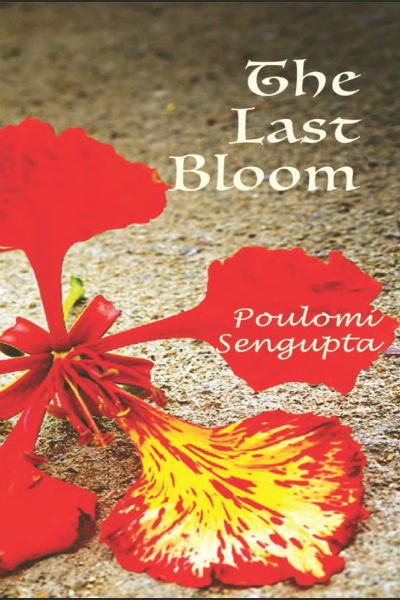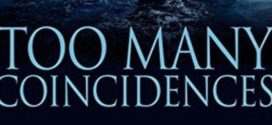Recently we got a chance to read The Last Bloom, a book by debutante author Poulomi Sengupta. The book touches the subject of politics in college campus and it’s impact on students.
The book also insists rightly that the college campuses are meant to be studied at. The politics should not affect the process of learning.

The Last Bloom by Poulomi Sengupta – Book Cover Page
It also raises some valid points like when we are talking about “brain drain”, we need to look at the environment we are giving to our youth. Those who are living the country for the better future loves the motherland like all of us. They also like to stay here with their families. But they also want to live in the fair environment where they get the reward for their skills.
We have a fantastic legacy, but we need to make even greater future and hence we need to work on to make the present situations much better than what they are. And together we can do it 🙂
Reading the book reminded me Hindi TV Serial Chunauti.
| Book Title | : | The Last Bloom |
| Author | : | Poulomi Sengupta |
| Publisher | : |
Frog Books Published: (10 February 2016) Leadstart Publishing Pvt Ltd Published: (22 February 2016) |
| # of Pages | : | 394 (Paperback) 1535 KB (Kindle Edition) |
The prologue of the book is fantastic and it irks so much expectations from the book. Here are some wise lines from the same.
“Beware of what you want.”
He paused.
“Excess of inundation brings flood.”
“Excess of principles brings only rules without actions.”
“Excess of purity brings bloodbath.”
He pointed towards the river.
So let us go ahead and check whether the book is able to satisfy the expectations.
Here are the prime characters of the book.
- Priya represents the voice of change.
- Suvo is the prototype of the master politicians in the country.
- Aashi is the true rebellion.
- Keya represents a conformist mentality.
- Priya’s father represents an average middle class Indian who has very low acceptance of uncertainty.
- Priya’s mother represents wise Indian housewife which is often undervalued for her intelligence, courage, bravery, wisdom and sacrifice
- Vivek is the voice of reason in the novel. He is the only character who is independent of any bondage in this novel.
Priya is a typical studios, no-nosense girl who join the college to study and get expertise in her sujbect of interest, Geology. She was not just bookwarm who have no knowledge of anything else but the subject books. She is a broad minded person who loves to explore the life properly. She was fond of literature and have read many good English and Bengali books among others.
When joined college she was introduced to her classmates, professors and the management; who behave differently than her expectations. While at school, everyone took study very seriously and lived a disciplined life, the things are different in college. Almost everyone is interested in study the least and enjoying the most.
There comes the concept of college level politics which almost ruins the study. The real meaning of study is to learn. However it is almost a rule that the students will be asked the questions from the solved papers, or for which notes are given in the class. Also in class, the professors repeat the lectures in the same pattern almost every year. So you simply need to mug up from the previous year notes. And there is no need to attend class.
The only good thing Priya encountered is some field trips, which are not as good as expected, at least for her. But she experience the real usage of her study.
There are political parties in the college, and you need to join one or the other. If you don’t want to join the parties, there is a liberty group (which is also actually a party), which insists you to join them. To keep yourself safe and supported, you need be be assoicated with either of them and you cannot afford to be neutral.
Is it what we call study? Why student hate learning and afraid of English as a language? Is study a crime? Why you need to join either of the political party? Why there are Andolans? Who gave the people right to damage public properties or vandalize others’ personal properties? Why students are interested in boycotting the classes?
Priya’s experiences, her going through dilemmas, her bond of friendship, her genuine family, her mature
friend Vivek, a typical politician in rising – Suvo ; and other stuff is explored in the book pretty effectively. We suggest you to explore it by reading it yourself. Telling more will be spilling beans about the books, which may affect adversely to your reading experience.
“Over the days, I got the perfect picture. I realized that most people cannot tolerate listening to the truth, leave alone speaking it. Humans are social animals. They are afraid to live alone and scared of the word called loneliness. Just for the sake of the current company, if people need to lie, they prefer to compromise the truth. Besides, no one will find out the truth. Only they know it individually. They do not realize that since each individual knows the truth, all know the truth.” I was bitter. It was impossible to cry in front of someone else. I turned my face away towards the plastic vase.
I could hear Vivek’s voice, unexpectedly kind, “Most people do not have a strong character that is why they remain as mere people; character evolves with time and also with the ingredients– if you add honesty, straightforwardness to the character then it evolves as strong, but if dishonesty, deviousness, and hypocrisy are added then with time the character becomes weak. This happens with time, immediate effects are not visible, only the effects are visible after a considerable time. Once that time is gone, nothing can be changed.
Vivek continued, “There comes a time in life, when there is nothing else to do, but to go your own way, when the way chooses you, when your fear to losing the way is gone because it does not matter to you anymore…”
I interrupted, “I cannot control situations, but I can regulate my responses. I can be honest and straightforward, not that good things will always happen to me because I am honest. There will be my shares of bad ones; I will still have the consolation that such a bad incidence has been caused because of honesty.”
“Our life is a choice. We can never choose the circumstances; they are completely destined but we can face the situations with honesty or dishonesty as that is definitely our choice. I don’t mind people hating me for what I am, but I will never forgive myself if people love me for what I am not,” I sighed.
“The whole world will not be your friend, irrespective of the fact that you make elephantine efforts to endear yourself to all. You will have friends and enemies; it is good to have friends and even better to have enemies, as at least you have stood up for something in life that is worthy of notice,” Vivek said in a silvery voice.
“It was sheer wastage of vital time. There were many problems that I saw the youth discussing, but no one took any step to protest or take any action against the wrong doers. Funny enough, they were not sure even about what they protested about.” He paused.
“I had heard from my father that recognition of problems precedes solutions. Here, I found that recognition of problems gives you more time to curse them and do nothing about them, just because you wait for others to find a solution for you, while you keep debating the matter, with a cigar in one hand and an alcohol glass in another, as that makes a picture perfect intellectual, as that keeps you safe from every angle.”
If the solution is found, in words, never in actions, then you take the credit of being the thinking nucleus of the idea, of course using your sole weapon– the brain, and moving not a single muscle. Work is crime. Oration is gift.”
These lines appears more than once in the book and you see its impact later on.
- I will never be like Aashi.
- Why do people in this college tell me exactly what I think about them?
There is also a chapter which ends with the same line it is started!
The author wrote some other good lines, some of them are…
- It is so strange that sometimes, small incidents leave a big impact on our lives.
- What is the point of acting so good if I do not enjoy it and it never gives me peace of mind?
- Everyone talks about the educational hurdle. No one talks about the emotional one.
- “The union culture is like ‘Bhag lo, nahi to bhaag lo‘.” Either participate else scoot.
- Just because people are acting like you doesn’t mean that they think like you. Bats can fly, but they aren’t birds, right?
- Ignorance precedes disrespect.
- The access to the gadgets and the utilities that they offer should not be criticized because we use it in our own ways. They are not alive, we are. They do not have a choice, we do.
- All conversations with seniors are not ragging sessions. Just like a boy and girl talking does not mean that they are a couple.
The story itself have freshness. We hadn’t seen any book (at least in near past) talking about college politics. Also through many dialogs the book reinforces the fact that colleges are meant to get studied. It is not all about just doing hanky-panking and have only fun, nothing else, there.
We must say that the author have studies the psyche (not necessarily academically) pretty well. The dialogs she put in the mouth of almost every character are quite realistic. She also have chosen a small town Baranpur as the university place rather than big town like Kolkata.
Also the mindset of middle class family (as a unit) and all it’s members quite effectively. There is not much fantasy stuff in the book and it works in favor of it. There are no rom-com scenes are either, but you won’t miss them. Writing a comparatively long book on such challenging subject requires research and courage both.
When you are looking to any work, as a third person you might have a different vision. And that is what happen when you read a book. You are viewing the author’s vision from your point. So you may not find a picture perfect anywhere. And so does here.
We found that the author have a good command on English and have a huge vocabulary. We wish that the language of the book, could have used some of the commonly used words, rather than it’s “not so easily found synonyms”. Those who passed out through English medium throughout and have a habit of reading world literature, may find it comparatively easy. However we must say that most of our youth is inspired by American way of English, i.e. use the basic stuff to convey your message.
Also the subject of Geology may not be attractive to many of the readers. Though those who are not much familiar with this subject may start liking it a little. That is also good achievement of Poulomi as an author.
We wish that there should be a comparatively long glossary at the end of the book. And it should cover some Geological stuff as well.
There are a very few author who mention bibliography in the book. It is definitely a nice gesture of the author to have it in the book.
The book have some chapters which are not to miss, and have some fantastic sentences which are worth remember.
The book is meant for adults and it contain some adult stuff and some stuff which require adult mind to understand. So in that way, it have a target audience who is mature.
The wise characters of Priya’s parents and Vivek got some meaningful conversations which you should not miss. Also the author’s playing with the words will impress you at places. Many middle class girls (and boys) will connect to the characters of the book pretty nicely.
There are some chapters which end with a shock and then it would end up not happening as expected in the next chapter. Towards the end of the book it seems that the author is juggling with her own thoughts in how to summarize it toward climax. So yes, the book have some flows in terms of events and pace. And we also wish that the prologue should link directly to the events of climax.
Summary:
Definitely a good book which touches a less touched subject. Some of the segments of this book are masterpieces with a few letdowns. A thought provoking book and is not meant for light reading. A read for mature readers.
Between 7-7.5 out of 10.
Kindle Edition | Amazon India
Paperback | Amazon India
Kindle Edition | Amazon.com
Paperback | Amazon.com
Did you find this review helpful? Share all your remarks with us via comments bellow. You can follow us on Twitter, Facebook and other social networks. And do not forget to share this article with your friends also. If you like to get updates for each new article published at ThinkerViews.com, you can subscribe to our RSS Feeds.
 ThinkerViews – Views And Reviews Personal views and reviews for books, magazines, tv serials, movies, websites, technical stuff and more.
ThinkerViews – Views And Reviews Personal views and reviews for books, magazines, tv serials, movies, websites, technical stuff and more.



